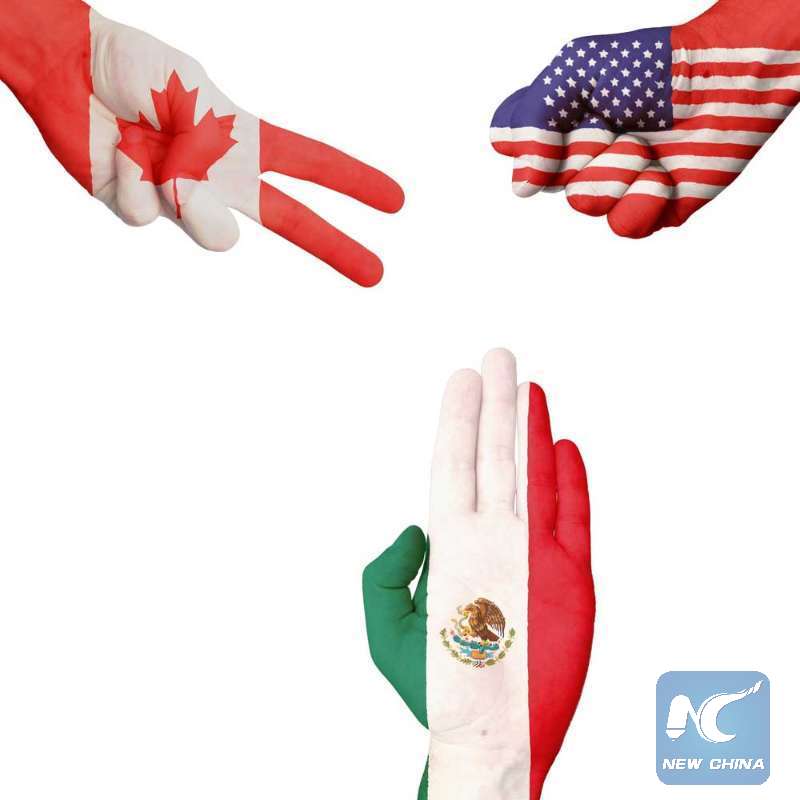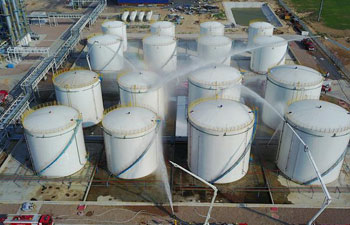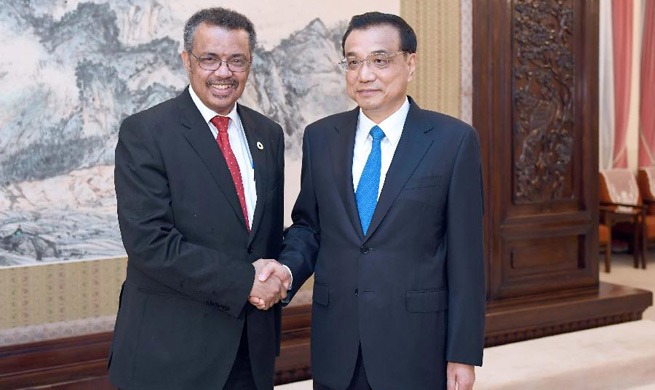
File photo
by Xinhua writers Gao Pan, Jin Minmin
WASHINGTON, Aug. 17 (Xinhua) -- Renegotiations on the North American Free Trade Agreement (NAFTA) are likely to drag on into 2019 due to the extensive agenda and elections in Mexico and the United States next year, a leading U.S. trade expert has said.
"There's a desire for an expeditious negotiation because of all of the political constraints in Mexico and in the United States next year," Jeffrey Schott, a trade expert and senior fellow at the Peterson Institute for International Economics, a Washington-D.C.-based think tank, told Xinhua in a recent interview.
However, "because the agenda of the negotiations is so extensive, so comprehensive, it will be very difficult for the three countries to come together on agreement on this entire agenda of issues in the next few months," Schott said, believing the chance of completing the NAFTA renegotiations by early next year is "very slim."
Negotiators from the United States, Canada and Mexico on Wednesday kicked off here the first round of NAFTA renegotiations that would last until Sunday, amid widespread uncertainty and anxiety over the future of the 23-year-old trilateral trade deal.
As Mexico will have a general election in July 2018 and the U.S. congressional mid-term elections are slated for next fall, negotiators have hoped that NAFTA talks could be wrapped up by early next year.
"There will be delays caused by electoral considerations, which will limit the flexibility of negotiators to make commitments and compromises before votes are taken," Schott said.
It's "very possible" that NAFTA renegotiations "will still be ongoing in 2019," he added.
Schott said the government procurement rules, rules of origin, domestic content requirements and dispute settlement are among the most contentious issues in the NAFTA renegotiations.
"There is concern about dispute settlement where the Trump administration wants to make some rather significant changes in existing NAFTA practice, which are strongly resisted by the Canadian and Mexican governments," he said, expecting that might be "one of the first flash points" in the negotiations this week.
While U.S. President Donald Trump has blamed the NAFTA for the huge trade deficits and the lost manufacturing jobs, Schott said these concerns aren't valid.
"One shouldn't be worried about bilateral trade deficits and a trade agreement is not going to affect a country's trade balance very much," he argued.
"If the Trump administration was really worried about the U.S. trade deficit ... they ought to do more about focusing on U.S. fiscal and monetary policies, the budget deficit, productivity growth in the economy," he said.
Schott believed that the United States has been losing manufacturing jobs for a long time and that's because the way goods are produced has changed largely due to technological advances instead of trade agreements.
"The proof of that is we don't have a declining manufacturing sector, we have a very healthy and productive manufacturing sector and our manufacturing output is near a record-high level," he said, adding "we're just using fewer workers to do that."
U.S. Trade Representative Robert Lighthizer has said that Trump is not interested in "a mere tweaking of a few provisions and a couple of updated chapters," and the United States would seek "major improvement" of the NAFTA.
But it's still unclear whether the Trump administration would really walk away from the deal if it couldn't get what it wants from renegotiations.
The costs of breaking up would be very high for all three economies, as North American integration has been going well for over 25 years, said Schott.
"Attempts to change that and disrupt existing supply chains and production networks that are linked together through extensive investments in each other's economy would prove extremely disruptive to production and employment in all three countries," he said.
"If the U.S. withdrew, it would cause significant pain for many U.S. exporters including many farmers that rely on the Mexican market for a large share of their crops sales," he said.
Many U.S. lawmakers are also very reluctant to see major changes to the NAFTA because of potential losses or uncertainty over the future of renegotiations.
"If they don't know what the potential losses are, they are concerned that there will be increased uncertainty and that it would be a negative factor for investment," Schott said.
Related:
Reducing U.S. trade deficits in NAFTA renegotiations could prove difficult
NEW YORK, Aug. 18 (Xinhua) -- Renegotiations on the North American Free Trade Agreement (NAFTA) will hardly reduce the overall U.S. trade deficit and unemployment, experts said.
The United States, Canada and Mexico kicked off the first round of renegotiations on NAFTA in Washington earlier this week.

















